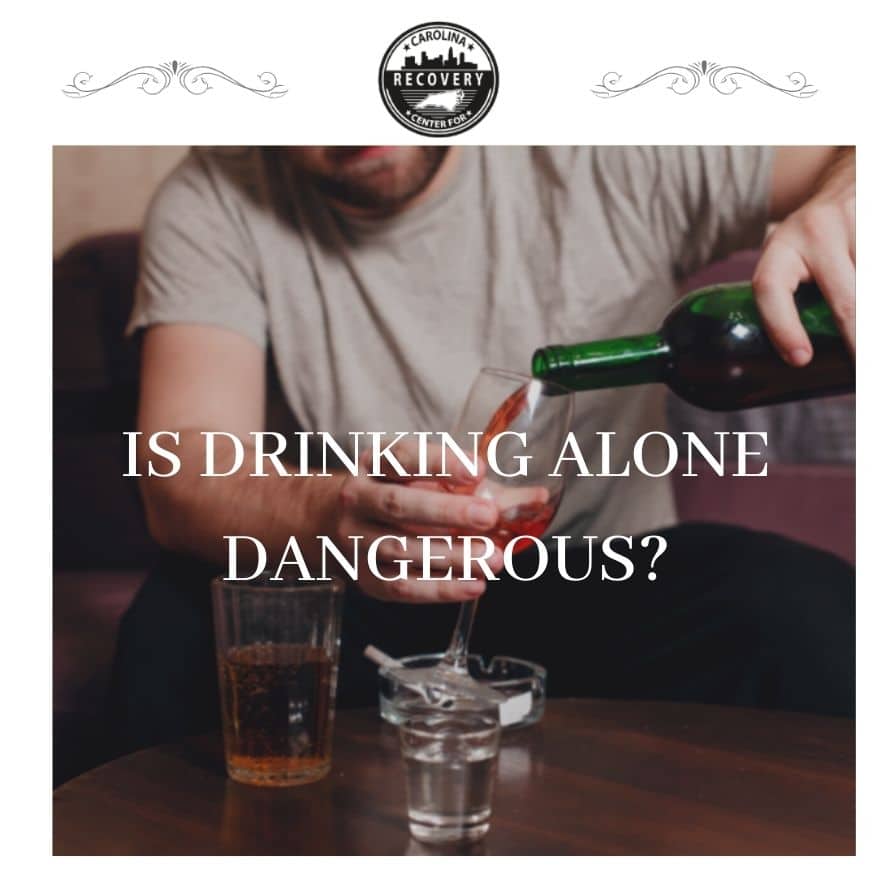Is Drinking Alone Dangerous?

Medically Verified: 2/1/24
Medical Reviewer
Chief Editor

All of the information on this page has been reviewed and verified by a certified addiction professional.
Many people enjoy a drink while spending time with friends or family. You might have a beer at a baseball game or backyard BBQ, a glass of wine with a special meal, or a cocktail at a party. In our culture, alcohol is often included in social events. But what about drinking alone? While curling up on the sofa with a glass of wine and a good movie might feel perfectly normal, sometimes drinking alone is a sign of a bigger problem.
You might have heard that drinking alone is a sign of alcoholism, but you might wonder if it is ever OK. The short answer is: it depends. Sometimes, people who have a healthy relationship with alcohol drink when they’re alone. But often, it’s a sign that some deeper issues might require attention. Taking a closer look at your solo drinking can help you understand if your drinking is safe and healthy, or if it is a sign that your relationship with alcohol needs some work.
Is Drinking Alone Problematic?
The term “slippery slope” is a bit of a cliche, but starting to drink alone can be the start of a bigger problem. It’s important to think about when and why your solo drinking started. It might be helpful to ask yourself these questions:
Why am I drinking?
Are you bored, lonely, or stressed? Having a beer or glass of wine can take the edge off those feelings, but only for a while, and at a cost to your health. Think about when you drink alone. Is it at the end of your workday or after your kids are in bed? Do you drink when you are feeling lonely or when you can’t find something else to do? Identify the time you are most likely to drink alone and consider what emotions you’re feeling before you pour that drink.
Are other people concerned that you are drinking alone?
Have you had a friend, partner, or family member talk to you about your drinking? Sometimes, it’s hard to see a problem when you’re in the middle of it. If other people have expressed concern about your solo drinking, take a step back to consider what they’re seeing.
How do you feel about your drinking?
As you pour that glass of wine or grab that bottle from the shelf, do a gut check. Do you feel guilty or ashamed of your drinking? Do you feel that you have to downplay your drinking, cover it up, or hide it from others? If you have concerns about your drinking, that is a sign that you might need to reexamine your relationship with alcohol–and you might need to get some support.
Why Do People Drink Alone?
People often drink alone to help them dull uncomfortable emotions. They may drink to take the edge off of stress or anxiety, to give them something to fill their time when they’re bored, or to help them momentarily escape from feelings of sadness. Drinking alcohol alone is not a solution to emotional problems–or any problems. While it may take away the discomfort of those feelings for a while, the physical and emotional problems alcohol often leaves behind are often bigger.
Someone might start drinking alone when they experience isolation. This could happen after moving to a new city where their social network is nonexistent, after a traumatic event, or because of social anxiety. Using alcohol to dull loneliness is common, yet ineffective.
For many people, starting to drink alone is a sign of early dependence or addiction to alcohol. You might need to drink alone because you are developing a tolerance to alcohol. Tolerance means that you require more alcohol to get the safe effect.
Understanding the Dangers of Drinking Alone
Drinking alone can be dangerous, both in long and short-term ways. While drinking alone, you face an increased risk of physical harm from a fall, accident, or fire. People who drink alone may also be more likely to drive while intoxicated.
People who drink alone are more likely to experience depression. Drinking and depression have a cyclical relationship. You might start drinking to dull the symptoms of depression, and then the drinking can make the depression worse, which then leads to more drinking. Drinking alone also leads to an increase in mood swings, suicidal thoughts, and behavior.
One of the biggest dangers of drinking alone is that it increases your risk of addiction or dependence. If you have concerns about your solo drinking, you may require substance abuse treatment to help you overcome your dependence or addiction. Treatment is the best way to get the skills you need to manage your emotions in a healthy way–without relying on alcohol.
Find Help for Alcoholism Today
If you or a loved one are struggling with alcohol addiction, please reach out to the staff at the Carolina Center for Recovery. We believe that everyone deserves to have a healthy, fulfilling life. That’s why we offer a range of high-quality, flexible treatment plans that empower people to overcome alcoholism and live the life they want.
Don’t put off treatment for another day. Call today to get started.

